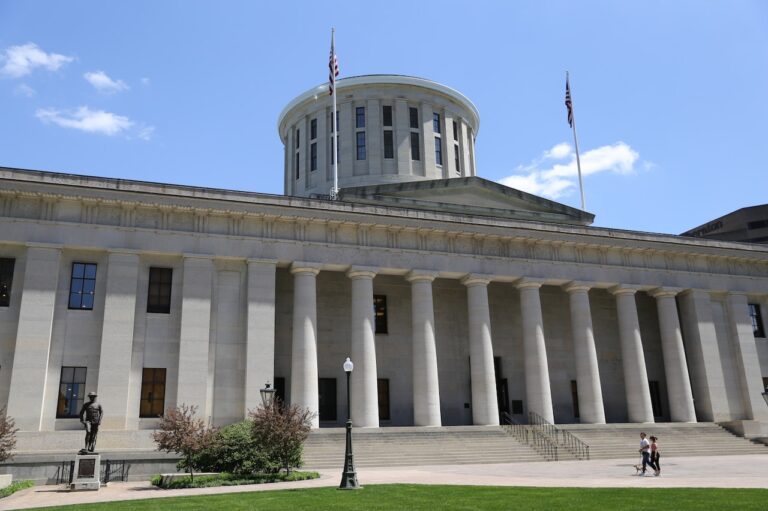COLUMBUS, Ohio — Ohio lawmakers are moving forward with a proposed agreement that would limit foreign donations to statewide ballot issues and allow President Joe Biden to appear on the November ballot.
The Ohio House Government Oversight Committee on Thursday morning approved a compromise between House and Senate Republicans on limiting foreign donations.
The agreement (House Bill 1) is expected to pass the Ohio House of Representatives on Thursday afternoon, along with another bill (House Bill 2) that would adjust the state’s election calendar so that Biden would appear on this year’s general election ballot despite violating the state’s candidate certification deadline. The Ohio Senate is set to follow suit on Friday, wrapping up a special session this week that Gov. Mike DeWine called to pass bills on two issues.
If passed, the newly revised HB1 would extend current laws banning state political contributions by non-U.S. citizens to state election campaigns and dark money groups. Republicans have been pushing for the move ever since Swiss billionaire Hansjörg Wyss donated millions of dollars to dark money groups that helped Democrats score two key victories on statewide election bills last year.
House Majority Leader Bill Seitz, R-Cincinnati, said the newly revised HB1 includes a number of compromises negotiated by House and Senate lawmakers, including whether the ban on ballot issue donations applies to green card holders (it doesn’t), the penalties for violating the ban (up to 180 days in jail and a $1,000 fine for a first offense, and up to a year in jail and a $2,500 fine for most repeat offenses), and whether the rules apply to both statewide and local ballot issue campaigns (it only applies to statewide ballot issues).
“Foreign funding has a fundamentally negative impact on our political process,” Seitz told reporters after Thursday’s committee vote.
Democrats also support a ban on foreign political contributions in principle, but oppose HB1 because the bill gives Attorney General Dave Yost more power to investigate possible violations of the foreign contribution ban. Democrats say they worry Yost, a Columbus Republican, will use that power to launch a politically motivated persecution of liberal ballot issue movements, pointing out that Yost has been lobbied to block a vote to repeal House Bill 6, a scandal-ridden energy bill, and that a federal court on Wednesday ordered Yost to stop blocking a ballot proposal to repeal police immunity.
“It’s completely misguided to give this kind of unlimited power to one person who has already proven he’s going to use that power for political purposes,” said Rep. Dani Isaacson, a Cincinnati Democrat.
The revised HB1 was also criticized by at least one House Republican, who argued that the compromise language did not go far enough to address the foreign funding issue.
“After three weeks of nonsense from the Ohio Legislature’s ‘leadership,’ we’ve ended up with an ineffectual, Democrat-leaning foreign money ‘ban’ that specifically allows green card holders to use funds to influence Ohio elections,” state Rep. Brian Stewart, a Pickaway County Republican, wrote on X. “The Biden administration will probably issue Hansjörg Weiss a green card before HB1 is even dry for signature.”
HB1 passed the House Government Oversight Committee on a party-line basis, but committee members voted unanimously to report HB2. HB2 would allow Biden to appear on Ohio’s 2024 general election ballot, even though this year’s Democratic National Convention is scheduled to take place about two weeks after Ohio’s Aug. 7 deadline for candidate certification.
House and Senate Republicans have been at odds for weeks over whether to pass Biden’s voting amendment on its own (as proposed by House Speaker Jason Stevens of Lawrence County) or, as Senate Republicans (and some House Republicans) have demanded, attach a foreign donation ban as a political price Democrats must pay to get Biden out of trouble.
The national Democratic Party announced Tuesday that delegates to the Democratic National Convention will meet remotely by Aug. 7 to certify Biden as their nominee, ensuring he appears on Ohio’s ballot. Democrats have so far shown no signs of abandoning that plan even if the Ohio General Assembly passes HB2.
Jeremy Pelzer covers state politics and policy for Cleveland.com and The Plain Dealer.

